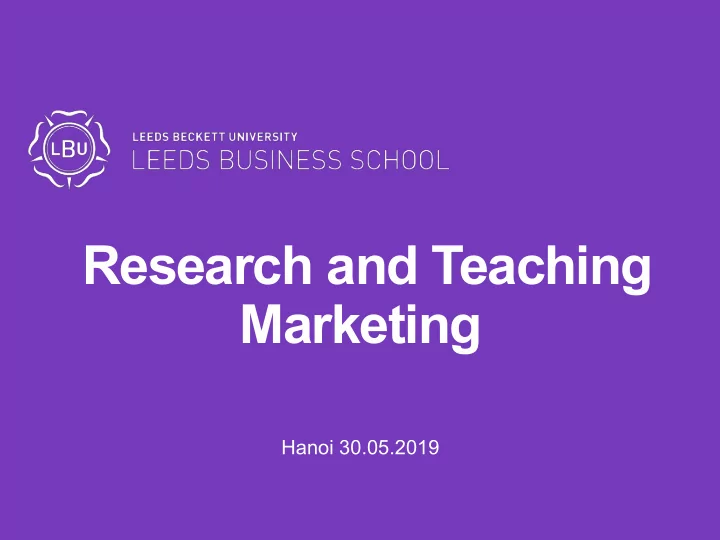

Research and Teaching Marketing Hanoi 30.05.2019
Overview 1. Introduction 2. Marking 2019 and beyond 3. Marketing education 4. Marketing research & publication
1. Introduction • Leeds Beckett University • Leeds Business School • Marketing Subject Group • Purpose of this visit
Headingley campus
City campus
Leeds Business School • Marketing • Accounting & Finance • PR & Journalism • Economics & International Business • Business Strategy, Operation and • Leadership, Governance & People Enterprise Management
Marketing Subject Group
Research Institutes and Centres • Sustainable Business Research Institute (SuBRI) • The Retail Institute (TRI) • Centre for Governance, Leadership & Global Responsibility (CGLGR)
A bit about me
Consultancy research with global brands
Purpose of this visit to Vietnam (I won the International Research Collaboration Building Prize to fund this visit) • Network with Vietnamese scholars for the research collaboration purpose. • Exchange knowledge and experience in marketing research and teaching. • Establish relationship with universities in Vietnam for future funding application from international funding sources.
2. Marketing 2019 and beyond
Shift in marketing focus CONECTIVITY CONTENT CUSTOMER CROSS-CHANNELS BRAND PRODUCT
Change in approach
Technology focus: Internet of things Google Home Smart label
Technology focus: Robotics and Automation
MARKETING IS AT THE FOREFRONT OF THE TECHNOLOGY and NEW PRODUCT DEVELOPMENT Marketers identify the needs and acceptance of customers and develop marketing strategies to promote it
Marketing analytics Moving from traditional to real-time and cross channels analytics
Influencer marketing • Users are spending 1.72 hours per day on social platforms, which makes up 28% of all online activity (Bennett 2015) • 74% of consumers relying on social media to influence their purchasing decisions (Bennett 2014).
Lifestyle marketing: LOHAS consumers (Lifestyles of health and sustainability) Ethical and sustainable consumption
Green marketing: Innovation focus Driven by policies and lifestyle changes of consumers
3. Marketing education
Marketing topics Specialist modules Generic modules • Branding • Marketing essentials • Advertising • Marketing com. • Consumer behaviour • Marketing research • Digital strategy • Social media • Marketing environment • Retailing • Marketing project • Green/ sustainability • Marketing planning marketing • Marketing strategy • Arts marketing • Fashion marketing • Marketing metrics
Teaching • Module 20 credits, 200 hours – 36 contact hours (12 lectures + 24 seminars) – 164 self directed study hours – 3-4 modules per semester • Assessment: – exam – coursework – presentation (group, individual, face-to-face or video presentation) – vlog/blog
Blended teaching and learning Real time Simulation Synchronised and Asynchronized learning
4. Marketing research & publication
General research interests • Consumer behaviour. • Digital marketing (e.g. influencer marketing, ecommerce). • Retailing. • Green/Health marketing. • Sustainable consumption and production.
Choose a journal: key to success • Topic relevance • Method relevance • Original • Theoretically sound • Open journal, worth it? • Special issue (good chance)
Journal type (Always useful to review some similar papers from the journal in recent years) • • Theoretical focus Quantitative – Experiment – Business management – Survey – Psychology – Scan data – Economics – Field data – Sociology – Big data – Anthropology – Number of studies – Interdisciplinary – Sample and sample size • Practitioner focus • Qualitative – B2B – Interview / focus group – (N)ethnography – B2C – Content analysis – C2C – Sample size • Type of industry – Method of analysis – Service oriented • Case study – Product / Brand oriented – Single/Multiple cases – Digital – Comparative cases • Theoretical but with Managerial – Sample size implication • Mix
From the scratch…
Choose a good topic? • A new or currently talked about topic always has an advantage. For example: – Digital/social media/ ecommerce/ peer-to-peer commerce. – Green/sustainability – Healthy lifestyle • A type of research question not many research have addressed (e.g. B2B, business cases – lack of data/ access to data) • A well researched topic needs a new theoretical or methodological angle. • An established (old) topic but links to a new policy, practice, lifestyle changes or a new dataset.
What if data has already been collected? Meet most of the requirements, but: – Small sample size? combine several similar studies; collect more sample; or turn it into a conceptual paper (so that the selling point is the theory idea, not the finding itself). – Findings are not new? choose a different theoretical underpinning which makes it more original (so that the selling point is the theory, not the finding itself). – Not sure about theory? team up with someone who knows. – Not sure about writing style? pay specialist editing service or team up with someone who is good in writing academic papers. – Weak in research design? Hmmm, this is often unfixable. Perhaps choose a lower ranking journal. Research design matters! Other things can be fixed.
Thank you
Recommend
More recommend